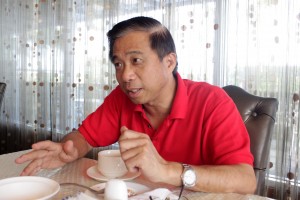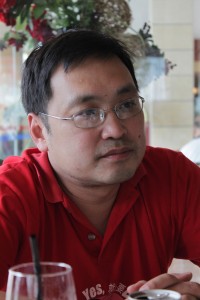BN’s boast of Sarawak being its fixed deposit state is under serious challenge. Years of oppression and discrimination has left its residents, especially the Dayaks seething with anger and restlessness. Sarawak DAP chairman Wong Ho Leng and state secretary Chong Chien Jen explains why some of the issues afflicting Sarawak may tip the burning cauldron over. The Rocket’s T.K Tan reports.
Economic Disparity
Lik e other states, bread and butter issues are Sarawak’s biggest concern. Nationwide, the increment in income is not keeping up with rising inflationary pressures. In this instance, Sarawak suffers doubly. Many of the basic necessities such as salt, sugar and diesel have to be transported to the interior areas by boats at exorbitant costs.
e other states, bread and butter issues are Sarawak’s biggest concern. Nationwide, the increment in income is not keeping up with rising inflationary pressures. In this instance, Sarawak suffers doubly. Many of the basic necessities such as salt, sugar and diesel have to be transported to the interior areas by boats at exorbitant costs.
Nationally, household debt has reached 60 percent of the country’s GDP, mostly for housing and private vehicle purchases. Sarawak’s situation is compounded by a poor public transportation system. Often the only forms of transportation available are private vehicles and boats. Sarawak’s passenger car sales increased by the year, fuelling by household debts.
In Kuching, the biggest city in Sarawak, there was nary a public bus in sight, even during rush hour traffic. “It’s a fact that many can’t afford to pay for the housing and transport necessities, so they have to incur debts. It’s the same in Sarawak,” Bandar Kuching MP Chong Chien Jen explained.
Compounding the matter is the uneven distribution of income in Sarawak. According to statistics released by the Ministry of Finance, income level for the highest income bracket (20 percent of the households) stood at RM 2600 a month. It is more than eight times that of the lowest income bracket (40 percent of the households) in the state.
There is also the lack of good paying job opportunities, especially for the natives. Many have to leave Sarawak to work elsewhere. Sibu MP Wong Ho Leng estimates that in Johor alone there are more than 40,000 Dayak sojourners working there.
“Perhaps more than 100,000 Dayaks are working in or have migrated to Peninsular Malaysia; my statement has even riled the Chief Minister to answer in the DUN. In my visits to many longhouses across Sarawak, the adults are nowhere to be seen. Only the old and children are at home. Who is fending for them?” Wong questioned.
“We have to solve Sarawak’s talent drain. It is an irony that Sarawak has so much natural resources such as land and timber but yet we can’t provide good jobs.”
Poor Infrastructure
Another issue that has irked the Sarawak folks endlessly is the poor or lack of the physical infrastructure. “Sarawak is at least 20 years behind Peninsular Malaysia in terms of infrastructure. This is admitted even by the chief minister himself,” Wong remarked.
First, there is the poor road system. “We have no proper highway linking the major towns of Sarawak, just a trunk road misleadingly known as the Pan Borneo Highway. It doesn’t have a single stretch befitting the definition of a highway.
“This ‘pride’ of Sarawak has become so notorious for accidents that Sarawak folks call it the Trunk Road to Hell. Between 2008 and May 2012, there were 10,424 accidents on Pan Borneo trunk road, among them 380 fatal cases.”
“There are more than 5,000 longhouses in Sarawak. The majority of them are in dilapidated condition. There are little infrastructure and roads serving them. Often the only way to get to them is through airplane, boats and 4WDs,” he added.
The basic amenity, electricity, is a luxury for many Sarawak residents. “About 33 percent of rural areas in Sarawak do not have electricity coverage, compared to 0.5 percent in Peninsular Malaysia. The irony is we have the Batang Ai hydro-dam and the Bakun Dam.”
“In many areas that I visited, particularly areas near the power grid and the dams, many longhouses do not have electricity supply. These areas are BN strongholds and served by Ministers. They include Sri Aman, Kapit, Mukah, and Bawang Assan.”
Another basic necessity severely lacking in Sarawak is piped water supply. In a visit to a village barely 100 kilometres outside of modern Kuching, this reporter saw numerous houses without piped water supply, a common scene in rural Sarawak.
Many residents are dependent on rain water for their daily usage. According to Wong, 41 percent of rural areas do not have water coverage, compared to 10 percent in Peninsular Malaysia.
 For Chong, the state’s education level is reeling from neglect and political interference. “The standard of education has dropped precipitously. Sarawak doesn’t have many public universities.”
For Chong, the state’s education level is reeling from neglect and political interference. “The standard of education has dropped precipitously. Sarawak doesn’t have many public universities.”
“Many working and middle class people can’t get affordable college education. The rural area students often have to travel in the wee hours of the morning to go to the nearest schools.”
“Even the CM has admitted that the state’s literacy rate is low, at 83 percent. 15.1 percent of the population did not receive any formal education. Only 9.3 percent had attained tertiary education,” he added.
Weeding Out Corruption
Much of Sarawak’s problems, like Malaysia’s, results from leakage due to wastage and corruption. Even the docile MACC has had to report that 60 percent of government’s allocations for infrastructure spending were siphoned off from 2002 to 2008. (The Star, 29 November 2009).
When mentioning about Sarawak’s corruption, one name inevitably creeps up – Pehin Sri Taib Mahmud. The Chief Minister family’s business tentacles reach into almost every sphere of state government projects. Chong list out some of the government contracts that Taib’s companies had received.
“The supply and delivery of crushed stone aggregates to Public Works Department (JKR) is handled by Cahya Mata Sarawak (CMS), Taib’s family flagship. For all its crushed stone aggregates need, the state JKR needs to procure from CMS alone at CMS’s listed prices.”
“Other services provided to JKR such as compacting road, road marking are also monopolised by CMS. Many of these contracts have been extended since 2006. They have also broadened the extent of the services offered to JKR. CMS and other crony companies are depriving deserving contractors of business opportunities,” Chong said.
Many of the plans by PR to help Sarawak hinges on the cooperation with the state government. “Land matters are the state government’s authority. To implement PR’s policies in Sarawak we will need to work with an honest and transparent state government. For that, Taib has to go,” Chong added.
“Without combating corruption the whole system will not remedy itself. It’s only by removing corrupt leaders from power and reinstating fair and just policies that Sarawak has a chance to solve its problems.”
Development, Uninterrupted
BN’s favourite campaign tactics to intimidate voters, slowing or stopping infrastructural development if a constituency votes in an opposition candidate, has been proven hollow.
In Sibu that threat has been rendered hollow several times since PR’s momentous by-election victory in the Sibu parliamentary seat in May 2010. Wong tells The Rocket why –
“When DAP won the Sibu by-elections and 12 state seats, infrastructural development has not stopped in those areas. In Sibu’s instance, opposition pressure has hastened infrastructural development.
Before the the last SE, the federal government promised RM 137 million to expand the Sibu airport. Work is gathering steam and on schedule. After years of highlighting the city’s flood problems, the government has begrudgingly dredged the river to alleviate the flooding issue.
After years of appealing, the city’s resident college Kolej Laila Taib (KLT) was converted into university status just before the Sibu by-election in May 2010.
In May 2012 the Prime Minister came to Sibu and promised to build a new university named the University College of Technology and scheduled to take in students in September 2013, 16 months away. The proposed site was to be near the KLT.
After two months elapsed without any work done, on 3 July I went to the proposed site and held a press conference. I asked when it would start work. Less than five hours later the excavators came and started doing clearing work. In a span of two years, Sibu is about to receive two universities.
Development will continue even if PR doesn’t form the federal government.” – The Rocket




Pingback: So….which party promises to fix all the bad roads (pot holes and whatnot) in this country? That party will surely get my vote! | Ir. NurHusna Johari'es